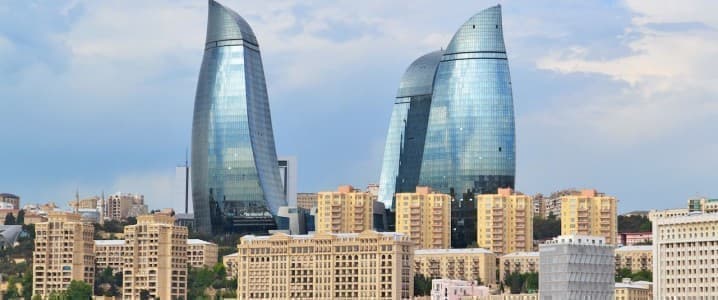One of the world’s forgotten conflicts is now making headlines again. In the last week, the military conflict between Azerbaijan and Armenia has reignited, with the two nations having already been engaged in a military confrontation for decades. Nagorno Karabach, an Armenian enclave inside of Azerbaijan, is one of the main underlying factors for the conflict, but the growing rivalry between Russia and Turkey is also playing a part. More than 16 soldiers have been killed in the most recent round of fighting. Both sides are accusing each other of aggression and military action. The use of full scale armed forces and drones have been involved, killing several soldiers on both sides and reportedly an Azerbaijani general. The current outbreak of fighting has been the deadliest since the “April War” of 2016. While most clashes normally occur in and around the Armenian controlled Nagorno-Karabakh region, the current clashes are on the international border between Armenia and Azerbaijan. The international community is urging both sides to end the clashes. The United States, European Union, and the OSCE Minsk Group are trying to defuse the situation. While it remains unclear what reignited the conflict, it seems that Armenia played a large role in increasing tensions. Armenia recently constructed a new military outpost, which could have given Armenian armed forces a tactical advantage and tempted Azerbaijan to strike. At the same time, Azerbaijan is being buoyed by strong support from Ankara and may have wanted to test Russia’s support for Armenia. Remarkably, Armenia has called upon the Russia-led Collective Security Treaty Organization (CSTO), of which Armenia is a member, to intervene. The CSTO’s response, from Yerevan’s point of view, however, is lacking. As of July 14, the CSTO has only called for a normalization of the situation on the border, not implying that it would provide military support for Armenia. The lack of vocal support from Moscow for Armenia is improving Azerbaijan’s position in the conflict. There is, however, a risk that the conflict will escalate to involve both Russia and Turkey.
While the military conflict may be drawing the majority of media attention, there is also an energy aspect to this conflict.
The military conflict gets full attention but another issue is a major threat to energy markets. The Caucasus is a major oil and gas transfer chokepoint, on which involves Russia, Turkey, Iran, Azerbaijan, Armenia and Central Asian countries. Energy market observers should be concerned about the proximity of the current military clashes to the Baku-Turkey oil and gas pipeline systems.

Threats to these important oil and gas pipelines, which not only connect the Central Asian producers to the global markets but also stabilize the region due to growth potential and revenues, are already significant. Gazprom Armenia, a subsidiary of Russia’s energy giant Gazprom, stated on July 14 that gas pipelines had been damaged near the border of Azerbaijan. Increased military action on both sides will only increase the danger to existing regional oil and gas infrastructure. Turkey will be hit hard if this conflict does escalate as it is largely dependent on oil and gas from the region.
Related: Second Wave Of COVID-19 Won’t Crush Oil Prices


Regional analysts are already assessing the possibility that the current flare up may have been instigated by Russia. The Tovuz region where the fighting is taking place is particularly close to Azerbaijan's crucial South Caucasia pipeline (SCP). The SCP channels natural gas to Turkey's TANAP pipeline and is a key component of Ankara's efforts to decrease its dependence on Russian energy. For years, Turkey has been trying to diversify its energy imports, but Ankara is still heavily dependent on Moscow. Russian gas is twice as expensive for Turkey than it is for most European customers, which is why Ankara is so desperate to move away from Russia gas. By getting Azerbaijani gas via TANAP, Turkey has been able to significantly reduce its costs. The Azeri-Turkish partnership could deepen further as a new opportunity arises in 2021, when a major gas deal between Turkey and Russia is up for renewal. Those discussions stalled in April when the two counties failed to reach an agreement. All of this combined means that Russia could be looking at losing market share in a very important growth market. Related: Russia Looks To Woo Tech Companies As Oil Lags
The main pipeline, the Baku-Tbilisi-Erzurum pipeline, that supplies gas to Turkey from Azerbaijan, passes through the Tovuz region of Azerbaijan. This area borders the Armenian Tavush, where the clashes took place. Due to its geopolitically strategic location, a possible Turkish military intervention, especially considering its operations in Syria and Libya, is not unthinkable. Blowing up the current infrastructure in Azerbaijan would almost certainly ensure Turkish military involvement. "Turkey will never hesitate to stand against any attack on the rights and lands of Azerbaijan," Turkish President Recep Tayyip Erdogan said Tuesday. Erdogan suggested a wider conspiracy lay behind the latest fighting. Turkish pro-government media have been quick to accuse Moscow of encouraging Armenia to attack Azerbaijan, albeit without substantiating evidence. Some analysts believe Turkey’s actions in Libya and Syria are related to this new conflict. Ankara could be forcing a new front, and the hand of Moscow, to get some bargaining power in North Africa.


Whatever the cause of this latest conflict, the situation is on a knife’s edge. Azerbaijan, via its defense ministry, has warned Armenia that it could launch missile attacks on its Metsamor Nuclear Power Plant. These threats could be easily be countered by Armenian actions on Azerbaijan’s weak point, its oil and gas transit pipelines. The fallout would be felt not only in European markets, but globally as well.
By Cyril Widdershoven for Oilprice.com
More Top Reads From Oilprice.com:
- New Tech Puts Lithium Batteries Back In The Energy Storage Race
- Five Value Stocks In Natural Gas
- Is This The Best Way To Produce Cheap Hydrogen?


















